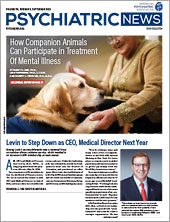When thinking about how to address the social determinants of mental health among children and adolescents, Lisa Fortuna, M.D., M.P.H., encouraged psychiatrists to widen their lenses. She pointed out the importance of listening to community voices and not restricting conversations to diagnosis and treatment planning.
“We really need to think outside of just our clinical settings,” said Fortuna, a professor of psychiatry and vice chair at the University of California, San Francisco, Department of Psychiatry and Behavioral Sciences and chief of psychiatry at Zuckerberg San Francisco General Hospital.
Fortuna was awarded the
Agnes Purcell McGavin Award for Prevention at APA’s 2023 Annual Meeting in San Francisco. The award recognizes a child and adolescent psychiatrist who has made significant contributions to the prevention of mental disorders in children and adolescents and influenced the general well-being of young people.
Fortuna, Tresha Gibbs, M.D., and German Velez, M.D., presented a session at the Annual Meeting that outlined some of the practical approaches to address social determinants of mental health of youth and children. Gibbs is an assistant professor of child and adolescent psychiatry in the Department of Child and Adolescent Psychiatry at NYU Grossman School of Medicine and clinical director of the Rockland Children’s Psychiatric Center. Velez is a child and adolescent psychiatry fellow at Weill Cornell Medicine and the Columbia College of Physicians and Surgeons Department of Psychiatry and APA’s resident-fellow member trustee.
Fortuna shared some examples of how psychiatrists can think outside of the conventional clinical lens and instead address social determinants of mental health through a health equity lens. For example, when assessing a child, the conventional lens would focus on what DSM-5 criteria the patient meets. But thinking through a health equity lens means asking: What types of social factors are influencing the child’s development and mental health?
“We know that social determinants of mental health have real biological consequences,” Fortuna said. “All of these barriers to seeking mental health care—cultural, financial, class, gender—all of these things can really have a significant impact on outcomes.”
Gibbs outlined the
resource document that APA’s Council on Children, Adolescents, and Their Families created on the social determinants of mental health in children and youth. The document outlines practical tools that clinicians can use, as well as key areas on which to focus to increase resilience in both children and their families. For children, social determinants of mental health include not just whether children have their basic needs met, but also the types of childhood experiences they’re having and the well-being of their caregivers, Gibbs explained.
Clinicians may screen for trauma among their patients, but they may not regularly screen for basic needs, nor do they regularly screen the caregivers’ mental health, Gibbs pointed out.
The resource document describes various interventions along a continuum, starting with upstream interventions (creating policies, laws, and regulations that have a community-level impact); midstream interventions (meeting social needs via communities or organizations, such as through food pantries); and downstream interventions (screening patients at the point of care).
The document also includes information on identifying the appropriate Z codes that clinicians can use for tracking, billing, documentation, and treatment-planning purposes. Tracking this information through Z codes can be an important way to understand patient needs at a population level, thus potentially diverting more resources where they are needed.
Velez described the
THRIVE Program at Boston Medical Center, which is embedded in the system’s electronic health record. It allows clinicians to document social determinants of mental health through ICD-10 codes, such as caregiver burden, food insecurity, and inadequate housing. Health professionals can share the patient’s contact information with the programs in the THRIVE directory that are designed to meet their various needs, Velez said. He described being able to immediately connect the patient and family with a resource to help address their needs while conducting the intake session.
Since the THRIVE program launched in 2017, over 100,000 patients have been screened, Velez said, and 28% reported at least one social determinant of health need. Further, 21% of patients requested support with at least one resource, and 2% of the patients needed help accessing food on the same day of their assessment.
He explained how THRIVE also helps clinicians feel they are doing something to address significant needs in patients’ lives. “It’s critically improving my relationship with patients, and I feel that it’s creating more engagement as well,” he said. “I am telling the patients that I see what their needs are, and I am connecting them with resources that can help.” ■

